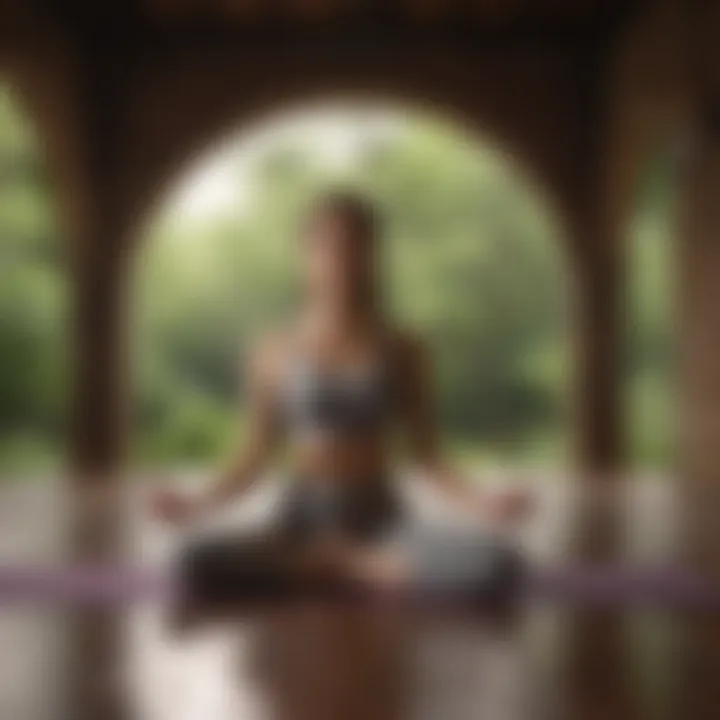Effective Strategies to Manage Anxiety Naturally


Intro
Anxiety can feel like a heavy cloud hanging over us. Many folks turn to medications in the hopes of washing that cloud away. But increasingly, people are seeking ways to tackle anxiety through other means. This article digs into diverse methods for managing anxiety without medication, shining a light on psychological techniques, lifestyle changes, and alternative therapies. The aim is to provide you with tangible strategies so that you can take control of your mental health naturally.
Understanding anxiety is the first step. It’s not just a one-size-fits-all issue; everyone feels it differently. The way we respond to anxiety is influenced by our experiences, environments, and personal strengths. With this exploration, we aim to offer something substantial for everyone willing to invest in their mental well-being.
Let’s journey through practical techniques and insights that might shift how you deal with anxiety day-to-day. We will cover effective approaches that incorporate both mind and body, intertwining them elegantly for holistic healing. Without further ado, let’s roll up our sleeves and dive into the strategies that can pave the way towards a calmer life.
Strategies for Success
Psychological Techniques
Diving into psychological techniques can really make a difference. Many find relief in cognitive behavioral therapy, which focuses on recognizing and changing negative thoughts. For instance, keeping a thought journal can help catch those pesky negative thoughts as they arise. Once you spot them, challenge their validity. This simple act of journaling not only helps identify triggers but also allows an individual to shift towards positive thinking.
- Practice Mindfulness: Mindfulness meditation encourages living in the moment, leaving behind worries about the past and future.
- Use Affirmations: Regularly repeating positive affirmations can shift your mindset. For example, telling yourself "I can handle this" can strengthen your resolve over time.
- Develop Resilience: Engage in activities that build your emotional resilience, such as hobbies that stimulate your creative side or talking openly with friends.
Lifestyle Modifications
Making small changes in your daily routine can usher in substantial benefits. Regular physical activity is a powerhouse method to combat anxiety. Even something as simple as walking in nature can clear your mind. Studies indicate that those who engage in consistent sport report lower anxiety levels. Here are some areas to consider modifying:
- Diet: Maintain a balanced diet rich in fruits, vegetables, and omega-3 fatty acids. Consider reducing caffeine, as it can ramp up anxiety levels.
- Sleep: Prioritize good sleep hygiene. A lack of sleep can exacerbate anxiety, so try sticking to a regular sleep schedule. Aim for seven to nine hours a night.
Alternative Therapies
Complementing traditional methods with alternative therapies can be beneficial as well. Several approaches provide additional support in managing anxiety:
- Yoga: This ancient practice combines physical poses with deep breathing and meditation, creating a powerful tool for relaxation.
- Aromatherapy: Essential oils such as lavender or chamomile have calming properties. Using a diffuser with these scents before bed may enhance your sleep quality.
- Acupuncture: Some have found acupuncture beneficial in reducing anxiety, believing its effects can rebalance the body's energy flow.
"In a world full of worries, finding your unique way to calm the storm is essential."
As you navigate these strategies, remember that progress might feel slow. Be kind to yourself along the way; every small step counts. There are plenty of anecdotal success stories out there from individuals who, through trial and error, have crafted their unique blend of techniques that works for them.
Understanding Anxiety
Understanding anxiety is the cornerstone of managing it effectively. Anxiety isn’t merely a feeling of fear or worry; it encompasses a spectrum of disorders that can impact one’s daily life, personal relationships, and professional ambitions. Thus, grasping the nuances of anxiety is essential for anyone looking to navigate their mental health without the aid of medication.
Recognizing the signs and symptoms of anxiety can lead to early intervention and better coping strategies. When individuals know exactly what they are dealing with, they become empowered. This empowerment is pivotal in forestalling the escalation of anxiety into something unmanageable. Identifying issues at this stage can promote a healthier mindset, ultimately breaking the cycle of anxiety before it spirals out of control.
Moreover, understanding anxiety allows for the exploration of various natural remedies and lifestyle changes. It opens up avenues for alternative therapies that might otherwise go unnoticed.
We’ll delve into how anxiety disorders are defined and their common symptoms in the following sections.
Defining Anxiety Disorders
Anxiety disorders encompass a range of psychological conditions that can manifest in different ways. The most prevalent types include generalized anxiety disorder, panic disorder, social anxiety disorder, and specific phobias. Each of these conditions has its unique characteristics, yet they share a common thread - they provoke excessive fear or worry beyond what a situation objectively warrants.
- Generalized Anxiety Disorder (GAD): This is characterized by persistent and excessive worry about various aspects of life, including health, finances, and work.
- Panic Disorder: Individuals will experience sudden attacks of overwhelming fear or discomfort, often accompanied by physical symptoms such as heart palpitations, shortness of breath, or dizziness.
- Social Anxiety Disorder: This particular disorder stems from an intense fear of social situations, driving individuals to avoid interactions that others might find trivial.
- Specific Phobias: These are irrational fears directed at specific objects or situations, like heights, spiders, or flying.
Understanding these disorders allows one to better articulate their own experiences or those of others, facilitating a pathway toward appropriate coping mechanisms. Furthermore, it highlights the fact that anxiety is not a sign of personal weakness, but rather a common mental health concern that demands attention.
Common Symptoms of Anxiety
Anxiety can present itself through a variety of symptoms, some more apparent than others. While individuals may experience symptoms differently, several common manifestations include:
- Restlessness: An inability to relax or feel at ease, leading to constant fidgeting or pacing.
- Fatigue: Chronic tiredness that is not solely due to physical activity; this can be tied to the mental drain from managing anxiety.
- Concentration Issues: Difficulty focusing on tasks or remembering information due to overwhelming feelings of worry.
While these symptoms can seem innocuous at first, when felt frequently or intensely, they can significantly disrupt everyday life. Recognizing and addressing these preliminary symptoms can allow individuals to develop strategies tailored to their own unique experiences with anxiety.
"Understanding anxiety is like giving oneself a roadmap; it highlights not just the bumps along the way, but also the routes that can lead to smoother travels."
By acknowledging the symptoms early, a person is in a better position to utilize strategies explored later in this article, ultimately striving for a life with less anxiety and more equilibrium.
The Role of the Mind-Body Connection
The interplay between mind and body is a fascinating area crucial for understanding anxiety. It's not just what we think but how our thoughts manifest physically that shapes our experience of anxiety. This section delves into how our mental states influence our bodily reactions, and in turn, how our physical well-being can affect our mental footing. The connection reveals the dual role our thoughts and feelings play in managing anxiety without turning to medication.
How Thoughts Influence Physical Well-being
The mind-body connection operates on the premise that thoughts can lead to physical changes. When anxiety creeps in, our thoughts often spiral towards worries—what if I fail? What if I embarrass myself? This can trigger a cascade of physical effects: increased heart rate, tension in muscles, or even digestive issues. Most of us know that feeling of butterflies in the stomach before a big presentation or a race.
Studies have shown that individuals who practice mindfulness and cognitive techniques can keep their stress responses in check. Techniques like visualization foster a positive mindset which can lower heart rate and enhance overall physical well-being. By recognizing harmful thinking patterns and actively replacing them, we can actually influence how our body responds to anxiety.
"Your mind has a powerful influence over your body; what you think can become your reality for better or worse."
The Impact of Stress on the Body


Stress is often seen as a silent killer, incrementally affecting our health and well-being. Constant stress enhances the production of cortisol, a hormone that, while necessary in moderation, wreaks havoc on our systems with chronic exposure. It can lead to tension headaches, fatigue, and a plummet in immune function, making it more difficult for the body to fight off inflammation or illness.
There’s an old saying, ‘fear is just excitement in disguise.’ This resonates here because anxious moments often spike stress levels, leading to physical repercussions. People may grip their jaws or hunch their shoulders, manifesting unspoken worries. By engaging in practices such as yoga or tai chi, individuals can learn to manage their breathing and posture, countering the physical effects of stress.
Managing the mind-body connection isn’t merely about awareness; it’s about actively shifting how we interact with our thoughts and our physical selves. By incorporating techniques that reduce stress and reframing negative thoughts, anyone can make strides toward beating anxiety naturally.
Cognitive Behavioral Techniques
Cognitive Behavioral Techniques (CBT) play a pivotal role in managing anxiety without the use of medication. These techniques are grounded in the understanding that our thoughts can significantly influence our emotions and behaviors. By identifying and reshaping negative thoughts, individuals can break the cycle of anxiety and cultivate a more resilient mindset. Engaging with CBT equips folks with practical skills to approach their challenges with a constructive lens, thus enabling them to tackle anxiety head-on.
Identifying Negative Thought Patterns
To initiate the journey of cognitive change, the first step is recognizing negative thought patterns. These thoughts often manifest as all-or-nothing thinking, catastrophizing, or excessive worry over inconsequential matters. For instance, if someone fears public speaking, they might constantly tell themselves, "I’ll embarrass myself in front of everyone," instead of acknowledging that making mistakes is part of learning.
Here’s how to effectively identify these thoughts:
- Keep a Thought Diary: Write down your thoughts whenever you feel anxious. Seeing them on paper helps in gaining perspective.
- Ask Questions: Challenge the validity of your thought. Is there solid evidence for this worry? What’s the worst that could really happen?
- Spot Patterns: Look for recurring themes in your anxiety. Recognizing these can help in understanding triggers and reactions.
Challenging Cognitive Distortions
Once negative thinking patterns are identified, the next step is to challenge those cognitive distortions. This involves critiquing the preconceived notions that fuel anxiety. Using logic and evidence to scrutinize these beliefs can significantly diminish their power. For example, instead of thinking, "Everyone must think I'm a failure," you might ask yourself, "What real evidence do I have of this? And does one incident define my entire worth?"
To challenge cognitive distortions effectively:
- Use the Socratic Method: Ask probing questions to dissect your thoughts. Question assumptions and seek alternative explanations.
- Reframe Your Thoughts: Convert negative thoughts into more balanced statements. From, "I can’t handle this," to, "This is challenging, but I can figure it out."
- Practice Mindful Awareness: Be aware of your thoughts without judgment. Recognizing that thoughts are merely that – thoughts, not facts – can help liberate you from their grip.
Developing Positive Affirmations
Positive affirmations serve as powerful tools to counter negativity. These are positive statements that can help to challenge and combat self-sabotaging thoughts. When utilized regularly, affirmations can foster a sense of self-worth and positivity—a much-needed antidote to anxiety.
Here’s how to craft and incorporate positive affirmations into daily routines:
- Keep It Realistic: Make sure your affirmations are achievable. Instead of saying, "I am perfect," try, "I am capable of growth and learning."
- Repeat Daily: Integrate affirmations into your morning routine. Saying them out loud while looking in the mirror can set a positive tone for your day.
- Visualize Success: As you say your affirmations, visualize each statement manifesting in your life. This mental imagery enhances belief and commitment.
Remember: The power of CBT lies in its practical application. By taking the time to identify, challenge, and affirm, individuals can transform their internal dialogue. This not only helps alleviate anxiety but also fosters an everyday mindset pivot toward resilience and empowerment.
Through consistent practice of these techniques, individuals can cultivate a healthier relationship with their thoughts and emotions, making strides toward a more tranquil life.
Mindfulness and Meditation Practices
In today’s fast-paced world, where distractions lurk around every corner, mindfulness and meditation serve as anchors to steady the restless mind. These practices not only offer peace and clarity but also provide essential tools in the journey of managing anxiety without medication. Fostering a mindful approach can lead to greater self-awareness and emotional regulation, proving beneficial for individuals grappling with anxiety. Let's unpack this vital area further to understand its mechanisms and implement it effectively.
Principles of Mindfulness-Based Stress Reduction
Mindfulness-Based Stress Reduction (MBSR) operates on the principle of intentional awareness. It encourages practitioners to pay attention to the present moment with an open mind and without judgment. The simplicity of this practice can be deceiving—it's not about clearing the mind completely but rather about acknowledging thoughts, feelings, and physical sensations without getting swept away by them.
- Awareness: Recognizing your environment, feelings, and thoughts is critical. This heightened awareness lays the groundwork for understanding triggers and reactions.
- Acceptance: Accept what you feel, without any labels of right or wrong. This is about letting go of the struggle against discomfort, realizing that feelings are temporary and manageable.
The process can be catalyzing. As people become more attuned to their internal experiences, they often find themselves less reactive to stressors, leading to healthier coping mechanisms. Studies have shown that practicing MBSR can lower cortisol levels, which are directly linked to stress and anxiety.
Techniques for Effective Meditation
Meditation can take various forms, depending on individual preferences. However, certain techniques stand out for their effectiveness in combating anxiety:
- Focused Attention Meditation: This involves focusing on a single point, such as your breath or a mantra. When thoughts drift, gently guide your focus back, fostering a sense of control.
- Body Scan: This technique encourages relaxation by systematically focusing attention on different parts of the body. It helps cultivate lively awareness and releases tension.
- Loving-Kindness Meditation: This practice emphasizes sending love and good wishes to others, which can foster connection and reduce feelings of isolation, a common symptom of anxiety.
Consistency is key. Whether it’s ten minutes a day or an hour, making meditation a routine helps build a sturdy foundation upon which resilience can flourish.
Incorporating Mindfulness into Daily Life
Bringing mindfulness off the cushion and into daily life is where real transformation happens. Here are a few practical strategies to weave mindfulness into your everyday activities:
- Mindful Eating: Instead of rushing through meals, take time to savor each bite. Notice flavors, textures, and aromas. This not only enhances enjoyment but also fosters a mindful approach to food choices.
- Mindful Walking: Whether it’s a stroll in the park or a commute to work, pay attention to each step. Feel the ground beneath your feet, notice your surroundings, and breathe.
- Digital Detox: Set aside time to unplug from devices. In a world dominated by screens, moments of silence can rejuvenate the mind and help regain focus on internal thoughts.
- Daily Check-ins: Set reminders throughout the day to pause, breathe, and acknowledge any emotions. This can become a powerful tool in recognizing and managing anxiety when it arises.
"The mind is everything. What you think, you become." - Buddha
Incorporating these strategies doesn’t require sweeping changes. Small, consistent practices often yield the most profound results.
Mindfulness and meditation practices empower individuals to not only confront their anxiety but also to thrive amidst it. The more one learns to navigate the intricacies of their thoughts and emotions, the less daunting anxiety becomes. By integrating these techniques into everyday life, one can foster resilience and cultivate a strong mental space.
Thus, amid the trials of anxiety, the power of mindfulness stands as a beacon, guiding individuals toward a balanced and fulfilling life.
Lifestyle Adjustments for Anxiety Management
Anxiety can feel like a storm brewing in your mind, churning thoughts and worries into a tempest that disrupts daily life. While medication can be a helpful tool for some, many individuals are looking for natural and holistic approaches to manage their anxiety. This is where lifestyle adjustments come into play. Modifying daily habits and routines can significantly influence emotional well-being, serving as powerful complements or alternatives to traditional treatments. Let’s delve into three fundamental lifestyle adjustments: regular exercise, nutritional considerations, and sleep hygiene practices.


The Importance of Regular Exercise
Exercise may not be the first thing that springs to mind when you think of combating anxiety, but its benefits are profound. Engaging in physical activity increases the body's production of endorphins—chemicals in the brain that act as natural painkillers and mood elevators. Regular exercise not only improves your physical health but also acts as a mental-release valve for stress.
Benefits:
- Mood Boost: Simple activities like walking or dancing can lift your spirits immensely.
- Routine Structure: Committing to regular exercise creates structure, something that many anxious individuals find comforting.
- Social Interaction: Group activities like yoga classes can enhance feelings of connectedness.
Whether it’s hitting the gym, going for a jog, or practicing yoga, finding a form of exercise that you enjoy can turn anxiety into a distant memory. It’s not always the quantity of exercise that counts, but rather the consistency that matters.
Nutritional Considerations
Food is more than mere fuel; it can act as both a friend and foe when it comes to managing anxiety. A well-balanced diet rich in nutrients fuels not just the body but also the mind. Poor nutritional choices can exacerbate feelings of anxiety.
Key Nutrients to Consider:
- Omega-3 Fatty Acids: These are essential for brain health and can be found in fish like salmon and walnuts.
- Magnesium: Known to improve mood, magnesium can be found in dark leafy greens and nuts.
- B vitamins: Important for energy production and cognitive function, they’re found in whole grains and legumes.
"You are what you eat" isn’t just an old saying; eating a diet rich in whole foods can drastically improve your mental health.
Remember that hydration is equally critical—dehydration can lead to fatigue and irritability, amplifying anxiety symptoms.
Sleep Hygiene Practices
Never underestimate the power of a good night’s sleep. An erratic sleep schedule can send anxiety levels soaring. Sleep and anxiety are intertwined; poor sleep can trigger feelings of unease and vice versa. Establishing a proper sleep routine is essential for mental clarity.
Practices to Enhance Sleep Hygiene:
- Consistent Sleep Schedule: Try to go to bed and wake up at the same time every day.
- Limit Screen Time: The blue light emitted by smartphones and monitors can interfere with your sleep.
- Create a Relaxing Environment: Ensure your bedroom is a haven for rest by keeping it dark, quiet, and cool.
"Sleep is the best meditation." – Dalai Lama
Finding balance through lifestyle modifications can have a valuable impact on anxiety management. As you go about your days, consider how each adjustment has the potential to make a physiological difference in your life, leading to the serenity you seek. Whether it's integrating exercise into your routine, paying attention to your diet, or prioritizing your sleep, these lifestyle adjustments can become part of your toolkit for overcoming anxiety naturally.
Alternative Therapies
Exploring alternative therapies opens the door to a treasure trove of options for managing anxiety. These approaches prioritize the body and mind's natural healing capabilities, often providing a wider array of tools that can complement traditional methods or stand alone. Many people find themselves disenchanted with conventional treatments and are increasingly drawn to holistic alternatives. Integrating these therapies not only diversifies one's coping strategies but also allows for a more tailored and personal approach to mental wellness.
Explorations in Herbal Remedies
When talking about herbal remedies, it's key to note that nature has gifted us with various plants whose properties have been valued for centuries. For instance, chamomile is often hailed as a natural sedative and antianxiety agent, calming frenetic thoughts after a long day. Meanwhile, kava kava, a root known for its relaxing effects, has gained popularity in recent years. However, always remember: Not all herbs are safe for everyone.
It's critical to do proper research and consult healthcare professionals, especially if taking other medications to avoid interactions. A balanced understanding of how these herbal options might fit into personal health routines can be quite enlightening.
The Benefits of Aromatherapy
Aromatherapy can easily be woven into daily life. This practice harnesses the properties of essential oils, invoking calmness and tranquility through scent. For example, lavender oil is widely praised for its ability to ease anxiety and improve sleep quality. Just a few drops in a diffuser can create a sanctuary at home.
Not limited to personal spaces, the benefits of aromatherapy can also extend to social settings or during work. Here’s a thought: how about a little peppermint oil on the temples before a big presentation? Different scents can elicit varied reactions, and finding what works best for you takes experimentation. The subtle integration of these oils might just help put that pesky anxiety at bay, one inhalation at a time.
Acupuncture and Its Effects on Anxiety
Acupuncture, commonly used in Traditional Chinese Medicine, involves inserting fine needles into specific points on the body. Many have found that this practice helps ease various ailments, including anxiety. The rationale is that stimulating these points can help balance the body’s energy, or “qi.” But is it effective?
Research indicates that acupuncture can lead to noticeable reductions in anxiety levels for some individuals. It may aid in releasing endorphins that create a sense of well-being. Like any treatment, responses can vary widely. Hence, it’s often prudent to choose a certified practitioner and maintain an open but analytical mind.
“A journey of a thousand miles begins with a single step.” — Lao Tzu. Embracing alternative therapies may be that first step to a more serene life.
Building Support Networks
Building a support network is not merely a suggestion but often a game changer in the journey of managing anxiety without medication. The idea is to cultivate a space where you can feel understood, seen, and assisted in processing your emotions and experiences. Support networks vary widely; they might include family, friends, peers, or even community groups. What’s crucial is the exchange of empathy and shared experiences that can significantly diminish feelings of isolation commonly associated with anxiety.
The Value of Peer Support Groups
Peer support groups serve as a powerful resource for those grappling with anxiety. In these environments, individuals come together to share their stories and struggles, fostering a sense of belonging that can be particularly comforting. This isn’t about professional therapy, but rather, it’s a space where people can relate to each other’s battles, providing solidarity and understanding. Participating in these groups can offer several benefits:
- Validation of Experiences: Knowing that others share similar feelings and challenges can help validate one's own experiences, reducing feelings of abnormality or isolation.
- Sharing Coping Strategies: Members can exchange techniques and ideas that have been effective in their own lives. What works for one may open new doors for another.
- Encouragement and Accountability: Regular interactions with peers can foster a sense of accountability, encouraging commitment to personal goals or improvements.
- Social Interaction: Reduces feelings of loneliness by providing regular social connections, which can be crucial during times of heightened anxiety.
- Resource Sharing: Members can recommend therapists, books, apps, or other helpful tools while sharing advice on navigating anxiety’s ups and downs.
In today's digital world, finding peer support has become more accessible than ever, thanks to platforms like Reddit and Facebook, where many groups exist specifically for anxiety management.
Engaging with Mental Health Professionals
While peer support can be invaluable, connecting with mental health professionals complements it by adding a layer of expertise. Therapists, psychologists, and counselors are trained to offer insights and techniques that can help clarify the nature of anxiety and empower individuals to tackle it appropriately. Engaging with mental health professionals provides a structured environment where:
- Personalized Guidance is Offered: Professionals can tailor their approaches based on individual needs, helping to identify specific triggers and coping mechanisms.
- Evidence-based Techniques are Utilized: Therapists often employ scientifically-backed methods such as cognitive-behavioral therapy (CBT) or acceptance and commitment therapy (ACT), which have been shown to be effective in managing anxiety.
- Professional Accountability is Introduced: Regular sessions provide opportunities to track progress, discuss setbacks, and stay focused on your journey towards wellness.
- Comprehensive Understanding of Anxiety Issues: Professionals can help decode the underlying issues associated with anxiety, such as trauma, lifestyle, or other psychological disorders that may be exacerbating the problem.
For ambitious individuals, establishing this connection can lead to significant insights and growth. Consider starting with an initial consultation, where professionals help outline the journey ahead. Seek recommendations from peers or community groups to find a provider who resonates with your experiences.
Building and nurturing both peer support groups and professional relationships creates a holistic framework for tackling anxiety, reinforcing the idea that you are not alone in this struggle.


Using Technology to Aid Recovery
In today's fast-paced world, technology plays a significant role in how we manage various aspects of life, including mental health. As anxiety becomes more prevalent, many are turning to tech-based solutions that can aid recovery without the need for pharmaceuticals. Technology offers innovative tools that enable individuals to take greater control over their mental health, bridging the gap between self-care and professional guidance.
Apps Focused on Mental Health
Mobile applications designed for mental health have gained traction in recent years. These apps can serve multiple purposes, from tracking moods to providing guided meditation sessions. Here are some notable benefits of using such apps:
- Accessibility: Users can access mental health resources right from their phones, making it convenient to engage in self-care whenever needed.
- Personalization: Many apps allow users to customize their experience based on their unique anxiety triggers and preferences. This tailored approach can significantly enhance the effectiveness of the recommended techniques.
- Progress Tracking: Users can monitor their emotional states over time, which can foster a better understanding of their mental health and help identify patterns that may need addressing.
Some popular choices in this realm include Calm, which provides meditation and sleep aid resources, and Moodfit, which helps users to track their mood and set actionable objectives.
"Technology can be a partner in mental health recovery when used mindfully and strategically." - Mental Health Expert
Online Therapy Options
As conversations about mental health have evolved, online therapy has emerged as a viable option for many. Often referred to as teletherapy, this form of counseling offers flexible access to trained professionals without the limitations of traditional therapy settings. Here are key factors to consider:
- Flexibility: Online therapy can fit into even the busiest schedules, allowing individuals to seek care from the comfort of their homes, eliminating the need to commute.
- Broader Access: Individuals living in remote areas may find it challenging to access therapists. Online therapy breaks those barriers, enabling clients to connect with specialists regardless of geographic location.
- Anonymity: For some, the stigma surrounding mental health can be daunting. Online therapy can alleviate this by providing a degree of anonymity, making it easier for individuals to open up about their struggles.
In practice, platforms like BetterHelp and Talkspace are pioneering the online therapy landscape, offering both chat and video session options to cater to diverse needs. It's an effective time to consider how technology intertwines with personal well-being, making every step toward anxiety management feel a bit more manageable.
Personal Stories and Case Studies
In understanding and effectively managing anxiety, diving into personal stories and case studies provides a compelling narrative that theoretical approaches often lack. These real-life experiences serve as both a mirror and a map for individuals grappling with their own mental health challenges. Hearing how someone else has navigated similar paths makes the journey feel less isolating, almost as if the burden of anxiety is shared among a community doing their best to heal.
By exploring numerous personal accounts, we see the vast spectrum of anxiety experiences. One person's antidote might be another's trigger, but therein lies the beauty of shared stories. Consider that through these narratives, readers can identify what worked, what didn’t, and more importantly, why they mattered. This can motivate a deep introspection on their own coping methods and strategies.
The primary benefits of using personal stories include:
- Relatability: A story might resonate with a reader's own struggles, validation that they are not alone.
- Diverse Perspectives: Different backgrounds and experiences mean varied coping strategies and outcomes.
- Motivational Insights: Witnessing how others have thrived can inspire hope and action.
While sharing personal journeys, it's crucial to maintain ethical considerations such as privacy and the importance of consent. Individuals should feel empowered to tell their stories without fear of judgment or stigma, which perpetuates the very issues they’re aiming to overcome. Ultimately, these narratives enrich the understanding of anxiety and the myriad methods to tackle it without medication.
Real-life Experiences of Overcoming Anxiety
Personal stories can provide a road map for recovery from anxiety. Take, for example, Sarah, a marketing executive who discovered yoga and meditation after struggling for years with debilitating anxiety. Her story is not just a testament to her perseverance but also a prescription for those feeling trapped in similar cycles.
Sarah's journey highlights a few critical takeaways:
- Incorporation of Practical Techniques: She began integrating mindfulness into her daily routine, allowing her to reclaim moments of peace during work chaos.
- Community Support: Joining a local yoga class introduced her not only to beneficial practices but also to a support network that stood by her.
- Self-Awareness and Reflection: By tracking her thoughts and feelings, she learned to identify early signs of anxiety, enabling her to cope proactively.
Lessons Learned from Personal Journeys
Every journey of overcoming anxiety carries lessons, not just for the individual but also for others walking a similar path. Consider James’s experience, an entrepreneur who faced panic attacks during crucial business meetings. Initially, he tried to ignore the issues, but that approach only exacerbated his anxiety.
From his tale, several key lessons emerge:
- Facing the Issue is Essential: Ignoring anxiety often lets it fester, while addressing it head-on brings clarity.
- Finding the Right Tools: James found success in a combination of CBT techniques and lifestyle changes. What lends strength to one person's recovery might differ for another, illustrating the importance of exploration.
- Openness to Sharing: By speaking openly about his struggles within his professional circles, he revealed common experiences among peers, generating peer support and reducing stigma.
Personal stories grounded in real-life experiences remind readers that anxiety can be confronted, understood, and ultimately managed through various means. It's an ongoing process of learning and adapting, just like any personal growth journey.
Final Thoughts on Anxiety Management
Understanding anxiety management is crucial in today's fast-paced world. As individuals navigate personal, social, and professional challenges, the prevalence of anxiety is only expected to grow. The significance of this section boils down to recognizing that managing anxiety is not a one-size-fits-all endeavor; rather, it’s a multi-faceted approach that requires attention to various aspects of one's life.
Prioritizing Self-Care
Self-care stands as a vital component in any anxiety management plan. It involves taking proactive steps to nurture both mental and physical health. When individuals make self-care a priority, they create a buffer against the stressors that often trigger anxiety. Consider actions like setting boundaries in relationships, allocating time for hobbies, or even engaging in activities that promote relaxation, such as taking walks in nature or enjoying a warm bath.
Here are some practical self-care strategies:
- Regular Physical Activity: Exercise can significantly boost mood and decrease anxiety levels. Whether it’s a brisk walk, yoga, or even dancing in the living room, movement is key.
- Nutritious Eating Habits: What we eat can have a direct impact on our mental well-being. Incorporating whole foods, plenty of fruits, and adequate hydration can elevate one's mood.
- Mindful Practices: Techniques like deep breathing or progressive muscle relaxation can calm the nervous system, making them invaluable tools in managing anxiety.
It's important to remember, however, that self-care is not selfish; it's essential. As you fill your cup, you become more equipped to face everyday challenges, ultimately leading to better overall mental health and well-being.
Encouraging Continuous Learning
The journey of managing anxiety is one that doesn’t have a definitive endpoint. Continuous learning is crucial in this regard. As we encounter new challenges, expanding our knowledge about anxiety can provide insights and strategies that enhance our coping mechanisms. This could involve seeking information from reputable health websites, engaging in self-help literature, or attending workshops and webinars focused on anxiety management.
Moreover, learning from others’ experiences also plays a significant role in this process. Personal stories often contain valuable lessons and tactics that resonate on a deeper level. Engaging with communities—whether online or offline—can foster a sense of connectedness, making the heavy load of anxiety feel a little lighter.
Some potential sources to explore include:
- Online Forums: Sites like Reddit often have vibrant discussions about mental health, where individuals share their experiences and insights.
- Books and Articles: Delve into literature that focuses on practical strategies and personal anecdotes related to anxiety management.
- Educational Videos: Platforms such as YouTube host specialists sharing techniques, success stories, or guided meditations, making complex ideas more digestible.
In essence, committing to continuous education about anxiety equips individuals with the tools they need to adapt their strategies as life evolves, thus paving the way for a more resilient self.
"Knowledge is power. But only if you use it."
Fostering a proactive mindset, embracing self-care as an indispensable partie of life, and encouraging continuous learning will contribute significantly to managing anxiety effectively—without the need for medication.



